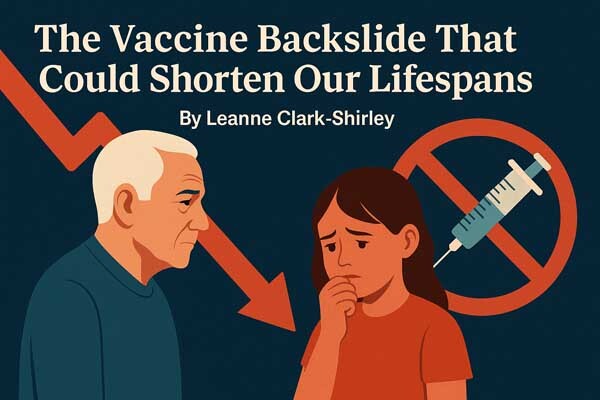
-
784 Views 0 Comments 0 Likes

DLNews Guest Columnist:
The Vaccine Backslide That Could Shorten Our Lifespans
By Leanne Clark-Shirley
The federal government is on the brink of reversing a century of medical progress for older adults.
As a social scientist, it's not often that I weigh in on medical policy. But as president of the American Society on Aging, which represents more than 5,000 professionals working with and on behalf of older adults, what I'm seeing alarms me.
Senior officials within the current administration are tacitly encouraging vaccine skepticism -- and it's jeopardizing the health of our rapidly aging population and undermining the longevity gains we've spent decades building.
If we continue down this path, older people today, as well as their children and grandchildren, could live shorter, sicker lives than those who came before them.
In 45% of counties nationwide, older adults now outnumber children. Millions rely on caregivers and community health workers who enter their homes and assist with daily living.
That makes vaccine policy not just a political debate, but a matter of life or death.
Yet the federal government is actively eroding the public's trust in, and access to, vaccines.
The administration recently irresponsibly fired every member of the Advisory Committee on Immunization Practices, functionally throwing away decades of institutional knowledge that guided vaccine recommendations.
Meanwhile, budget cuts at the Centers for Disease Control and Prevention and Food and Drug Administration threaten to delay research and approval for vaccines tailored to aging bodies, like those targeting RSV, shingles and pneumococcal infections.
That could leave older people vulnerable to new viral strains and unable to access the preventive care so many have counted on their whole lives.
The danger doesn't end with today's older adults. Today's unvaccinated children are tomorrow's elders.
Take measles, for instance. Thanks to a widespread immunization campaign, the United States eradicated measles in 2000. Now cases are soaring as vaccination rates drop.
Downplaying the severity of the infection is dangerous. Secretary of Health and Human Services Robert F. Kennedy Jr. recently claimed that measles infection provides lifelong protection in a way that vaccines don't.
Research shows that's not true.
Scientists have discovered that measles causes "immune amnesia" -- potentially wiping out more than 70% of a child's antibody defenses against other diseases.
Children who survive measles become far more vulnerable to other infections for years afterward. More broadly, a growing body of evidence shows that access to preventive care in childhood, including immunizations, lowers the risk of chronic illness and disability in later life.
Childhood vaccinations don't just prevent infections. They are a building block for healthy aging. Skipping them early on may set people up for greater impairments and shorter lifespans decades down the road.
These policy changes are also taking a personal toll on older people and caregivers, who are experiencing growing anxiety and confusion. A free, effective shot used to be something they could count on.
For the past century, vaccines have made it increasingly possible for Americans to reach old age and experience longevity. To throw that away now, during the greatest aging boom in our history, would be shortsighted and tragic.
We need clear, science-driven vaccine guidelines, robust funding for immunization research and public messaging that builds trust instead of fear.
Leanne Clark-Shirley, PhD, is the president and CEO of the American Society on Aging.
vaccine American Society on Aging Centers for Disease Control Robert F. Kennedy Jr. Robert F. Kennedy Jr. Leanne Clark-Shirley

Desert Local News is an invitation-only, members-based publication built on fact-checked, non-biased journalism.
All articles are publicly visible and free to read, but participation is reserved for members—comments and discussion require an invitation to join.
We cover local, state, and world news with clarity and context, free from political agendas, outrage, or misinformation.